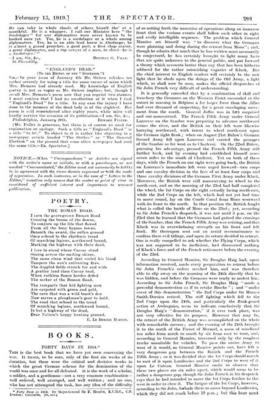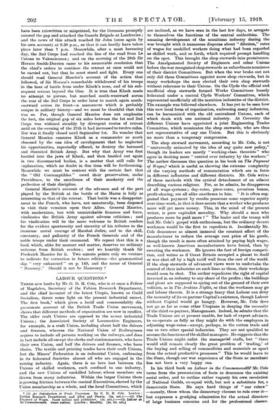BOOKS.
FORTY DAYS IN 1514.*
TAM is the best book that we have yet seen concerning the war. It treats, to be sure, only of the first six weeks of its duration, but these were the critical and decisive weeks in which the great German scheme for the domination of the world was once and for all defeated. It is the work of a scholar, a soldier, and a gentleman—not a very common combination— well ordered, well arranged, and well written ; and no one, who has not attempted the task, has any idea of the difficulty • Forty Days Cu 1914. 117 haler-Generel Slr P. %dice. C.D. London: toustasta, Los, sew
of so setting forth the narrative of operations along an immense front that the various events shall follow each other in right and easily intelligible sequence. The problem which General Maurice set himself was " to discover what the Germans were planning and doing during the retreat front Mona"; and, though he admits that much that he has written must necessarily be conjectural, he has certainly brought to light many facts that are quite unknown to the general public, and put forwarsl a theory which accounts better than any that has been hitherto adduced for the rather astonishing vagaries of Klock. But the chief interest to English readers will certainly be the new light that he sheds upon the doings of the Old Army, a light which, as shall now be seen, makes the official despatches of Sir John French very difficult of understanding.
It is generally conceded that by a combination of skill and treachery the Germans on the Western Front succeeded at the outset in massing in Belgium a far larger force than the Allies had ever dreamed of suspecting, for a great enveloping move- ment from the north. General Joffre was in fact surprised and outmanoeuvred. The French Fifth Army under General Lanrezac on the Sambre was preparing to advance northward across the river, and the British on their left were likewise hurrying northward, with intent to wheel north-cast upon the German right flank ; when on August 21st Nile's's German Second Army fell upon Lanrezac and carried the passages of the Sambre as far west as to Charleroi. On the 22nd Billow, pursuing his advantage, pressed the French Fifth Army still further back, and by evening had established himself some seven miles to the south of Charleroi. Yet on both of these days, while the French on our right u-ere going back, the British ou Lsnrezae'n immediate left were urged forward—two corps and one cavalry division in the face of at least four corps and three cavalry divisions of the German First Army under Klock. Moreover, the British were still manoeuvring to wheel to the north-east, and on the morning of the 23rd had half completed the wheel, the let Corps on the right actually facing north-east, while the 2nd Corps on the left, which had not yet had time to move round, lay on the Conde Canal from Mons westward with its front to the north. In that position the British fought what is called the battle of Mons on the 23rd ; yet, according to Sir John French's despatch, it was not until 5 p.m. on the 23rd that he learned that the Germans had gained the crossings of the Sambre, that the French Fifth Army was retiring, and that Black was in overwhelming strength on his front and left flank. He thereupon sent out an aerial mconnaissance to confirm these evil tidings, and upon its return decided to retreat. Otte is really compelled to ask whether the Flying Corps, which was not supposed to be inefficient, had discovered nothing of Kluck's force and of the French retirement before the evening of the 23rd.
According to General Maurice, Sir Douglas Haig had, upon information received, made every preparation to retreat before Sir John French's orders reached him, and was therefore able to slip away on the morning of the 24th directly that he was bidden, and before the Germans were ready to molest hint. According to Sir John French, Sir Douglas Haig " made a powerful demonstration as if to retake Binche " ; and " under cover of this demonstration " the 2nd Corps under Sir Horace Smith-Dorian retired. The stiff lighting which fell to the 2nd COrps upon the 24th, and particularly the flank-guard action at Andregnies, seem to indicate conclusively that Sir Douglas Haig'a '! demonstration," if it ever took place, Was not very effective for its purpose. However that may be, the retreat of the British Army was accomplished on the whole with remarkable success ; and the evening of the 24th brought it to the north of the Forest of Mormal, a mass of woodland ten miles from north to south by six front east to went, and, according to General Maurice., traversed only by the roughest tracks unsuitable for vehicles. To pass the entire Army to west of it would, as General Maurice points out, have left a very dangerous gap between the British and the French Fifth Army; so it was decided that the lot Corpsshould march to east of it upon Landrecies and the 2nd C'orps to west of it upon Le Gateau. General Maurice omits to observe that these two places are six miles apart, which would scent to be 'ratite' a dangerous gap, though Sir John French in his despatch soya that be had intended to move the 1st Corps further to the west in order to close it. The fatigue of the let Corps, however, according to Sir John, forbade them to move beyond Landrceies, which they did not reach before 10 p.m. ; but this hour must
have been miswritten or misprinted, for the Germans promptly entered the gap and attacked the Guards Brigade at Landrecies ; and the news of this attack reached Sir John (once again by his own account) at 9.30 p.m., so that it can hardly have taken place later than 7 p.m. Meanwhile, after a moat harassing day, the 2nd Corps had reached the line of the road from Le Cateau to Valenciennes ; and on the morning of the 26th Sir Horace Smith-Dorrien came to his memorable resolution that the chief's orders to continue the retreat at once could not be carried out, but that he most stand and fight. Every one should read General Maurice's account of the action that followed, of Sir Horace's remarkable withdrawal of his troops in the heat of battle from under Kluok's nose, and of his sub- sequent retreat beyond the Oise. It is true that Kluck made no attempt to pursue, but marched south-westward across the rear of the 2nd Corps in order later to march again south- eastward across its front—a manoeuvre which is probably unique in military history—and we must be thankful that this was so. For, though General Maurice does not emphasize the fact, the original gap of six miles between the 1st and 2nd Corps was widened steadily by divergent routes of retreat until on the evening of the 27th it had increasedto twelve miles. Nor was it finally closed until September let. No wonder that General Maurice censures Klock as a commander so much obsessed by the one idea of envelopment that he neglected his opportunities, repeatedly offered, to destroy the harassed and disunited British Army. But why that Army was first hustled into the jaws of Klink, and then hustled out again in two disconnected bodies, is a matter that still calls for explanation, which no doubt in due time will be forthcoming. Meanwhile we most be content with the certain fact that the " Old Contemptibles " owed their preservation, under Providence, to the excellence of their musketry and the perfeotion of their discipline.
General Maurice's account of the advance and of the part played by the British at the battle of the Marne is fully as interesting as that of the retreat. That battle was a diroppoint- ment to the French, who have, not unnaturally, been disposed to visit their vexation upon their Allies. General Maurice, with moderation, but with unmistakable firmness and force, vindicates the British Army against adverse criticism ; and his vindication will be the more welcome to British readers for the evident spontaneity and sincerity of his tributes to the immense moral courage of Marshal Joffre, and to the skill, constancy, and gallantry of the French Generals and of the noble troops under their command. We repeat that this is a book which, alike for manner and matter, deserves no ordinary welcome from British readers ; and we heartily thank Sir Frederick Maurice for it. Two minute points only we venture to indicate for correction in future editions—the grammatical slip " very exhausted " on p. 149, and the name of General " Mammy." Should it not be Maunoury ?



































 Previous page
Previous page